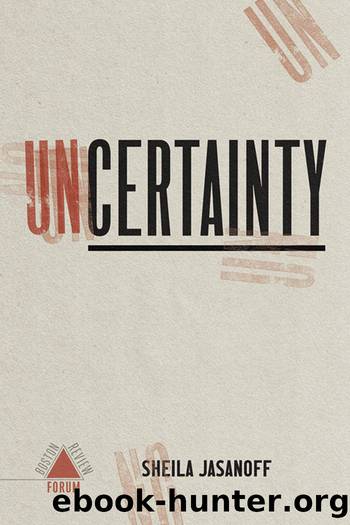Uncertainty by Sheila Jasanoff

Author:Sheila Jasanoff [Jasanoff, Sheila]
Language: eng
Format: epub
Publisher: MIT Press
Published: 2021-12-07T00:00:00+00:00
by the mid-1990s, sociologists of risk and insurance had identified a large-scale shift in Western capitalist societies, away from compensatory âinsurantial logicsâ and toward the âembrace of risk.â This argument, popularized by Baker and sociologist Jonathan Simon in their 2002 book Embracing Risk, emphasized the celebration of risk-taking, particularly among elites, that became prevalent in the United States and other nations during the 1980s and 1990s.
Baker and Simon's work remains relevant today, but it largely overlooks the negative impacts of the privatization of risk. To speak of âembracing riskâ suggests a choice, but many Americans have never had one. Forced to seek security via the private market, they were exposed to its whims. It was precisely the risk-taking behavior of financial elites that caused the Great Recession, and a privatized security system designed to shift the burden of risk onto individuals and away from corporations and governmentâa process political scientist Jacob Hacker calls the âGreat Risk Shiftââonly deepened the consequences of the economic crisis. The result has harmed most middle- and working-class Americans, who have been forced to take on the heavy burden of achieving security on their own, distanced and divorced from the collectives that might have offered a base to stand on.
The situation is not all bleak, however. Increasing precarity and exposure to risk have led to resistance, particularly among younger Americans. Calls to further regulate the insurance industry and politicize risk classification, to remove profit from the pursuit of security, and to build and expand public insurance programs have greatly multiplied since the financial crisis, and health insurance has emerged as a major site of activism and policy discussions in recent elections. This activism differs from earlier efforts in its willingness to directly challenge the profit motives of insurance companies, and, crucially, in its calls to abolish private health insurance as an industry. Nationalization of health insurance in the United States may very well lead to calls for expansion of other public insurance programs and the nationalization, or significant reform, of other insurance fields.
How might we build on this momentum to bring about a new insurance era? The first step will be understanding the basic workings of insurance and the often hidden role it plays in our lives. Insurance has long served as a reminder of the pervasiveness of uncertainty and our helplessness in the face of chance. But it also emboldens us as agents with the power to care for one another and to compensate for misfortune through collective means. What we do with that power will depend on our willingness to imagine futures that look different from our presentâfutures less like Pohl and del Rey's vision of a society infinitely divided, and more like Royce's dream of a human community that rises or falls together.
Download
This site does not store any files on its server. We only index and link to content provided by other sites. Please contact the content providers to delete copyright contents if any and email us, we'll remove relevant links or contents immediately.
Zero to IPO: Over $1 Trillion of Actionable Advice from the World's Most Successful Entrepreneurs by Frederic Kerrest(4568)
Machine Learning at Scale with H2O by Gregory Keys | David Whiting(4313)
Never by Ken Follett(3956)
Harry Potter and the Goblet Of Fire by J.K. Rowling(3857)
Ogilvy on Advertising by David Ogilvy(3622)
Shadow of Night by Deborah Harkness(3368)
The Man Who Died Twice by Richard Osman(3078)
Book of Life by Deborah Harkness(2939)
The Tipping Point by Malcolm Gladwell(2921)
Will by Will Smith(2919)
Purple Hibiscus by Chimamanda Ngozi Adichie(2853)
0041152001443424520 .pdf by Unknown(2845)
My Brilliant Friend by Elena Ferrante(2831)
How Proust Can Change Your Life by Alain De Botton(2814)
How to Pay Zero Taxes, 2018 by Jeff A. Schnepper(2655)
Hooked: A Dark, Contemporary Romance (Never After Series) by Emily McIntire(2554)
Rationality by Steven Pinker(2363)
Can't Hurt Me: Master Your Mind and Defy the Odds - Clean Edition by David Goggins(2341)
Borders by unknow(2313)
